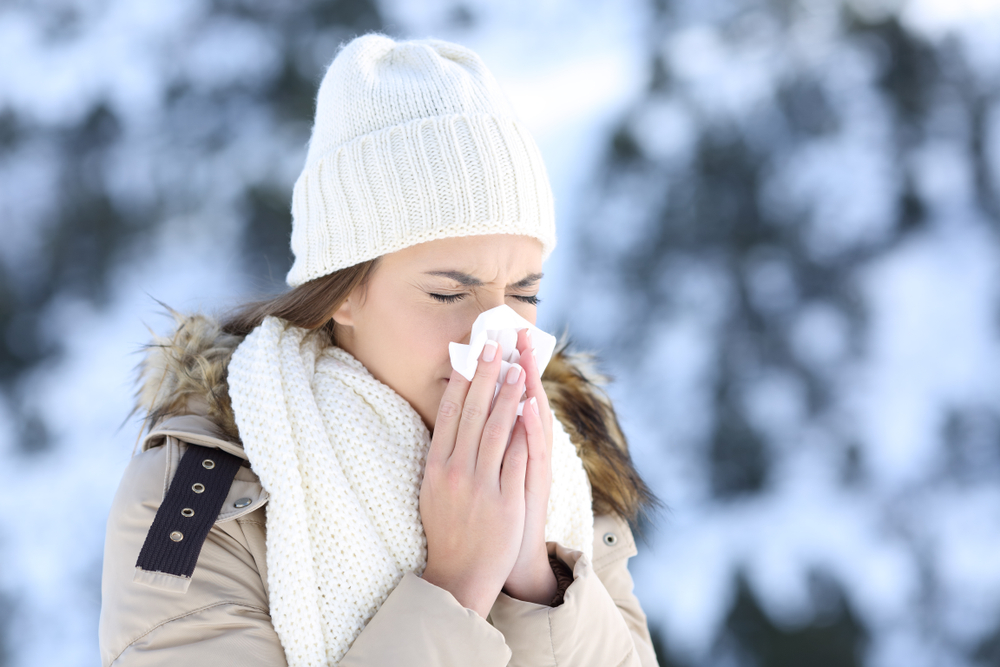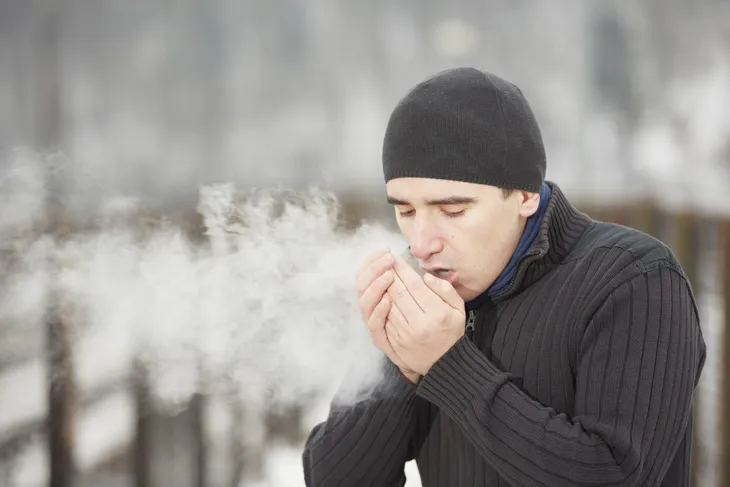Shorter days and chilly air transform daily routines, bringing unique challenges to personal health. As temperatures drop, our bodies work harder to stay warm, often leaving our immune systems more vulnerable to illness. From sniffles and dry skin to more serious threats like slips and respiratory issues, winter introduces a variety of seasonal risks. Staying informed and making simple adjustments can help safeguard your well-being, allowing you to enjoy the beauty of winter to the fullest.
Respiratory Viruses
Contrary to what some think, you don’t get a cold or flu simply by being out in the cold. However, the lower temperatures do make it easier for some viruses (namely the common cold) to invade your body and even replicate faster, according to Everyday Health.
However, there are some ways to reduce the risk of getting sick from a cold or flu. One way is to ensure you wash your hands regularly. Another is to get a flu shot, which significantly reduces the chance of major symptoms. The source also suggests to “cut back on dairy and sugar, both of which affect congestion and your ability to fight off viruses.”
Dry, Itchy Throat
The University of Utah Health talked to an ear/nose/throat (ENT) specialist about specific throat issues in the wintertime, such as being itchy and irritated. The source notes that upper respiratory tract infections are a common reason why sore throats are rampant during the snowy months. The humidity in the air is also lower in the winter, meaning throats can simply get dry.
The specialist also notes that exercising outside during the winter can raise the risk of a dry throat. While you can’t do much about the outdoors, the source suggests adding a humidifier to your bedroom and running it with the door closed. A sore throat can also be caused by heartburn/acid reflux. Note, you should contact your doctor if the sore throat is new and stays for 2 or 3-weeks.
Strep Throat
In some cases, that sore throat could be a sign of the dreaded strep throat, caused by bacteria known as Streptococcus pyogenes. The Mayo Clinic says this infection can make your throat feel scratchy and irritated, as well as cause swallowing to be painful. Swollen tonsils, a headache, and a rash are also possible symptoms. Left untreated it can cause some complications such as rheumatic fever (that can cause painful joints) or kidney inflammation, the source warns.
Strep throat is more common among children, but it can be spread to anyone of any age. One of the risk factors for strep is the time of year. While you can experience it any time, it circulates more in the winter and early spring. The source suggests washing hands using soap and water/sanitizer to prevent the spread, as well as not sharing drinks or other personal items. Oral antibiotics are commonly prescribed to clear up strep throat once it’s diagnosed.
Dry/Itchy Skin
Your throat is not the only place that’s at risk of drying out during the winter. Cleveland Clinic says dry, itchy skin is more common during this time of year. Luckily, there are some fairly simple ways to get around this issue any time of year, such as avoiding long, hot showers (use warm water instead) and then using body lotion (creams work even better, the source says) right after your shower to “seal in moisture.”
If moisturizers don’t work to relieve itching, then you should arrange to see a dermatologist, the source advises. The source also says to protect your face when you’re trudging around in sub-freezing temperatures, apply a layer of petroleum jelly to reduce the risk of windburn and frostbite.
Frostbite
This potentially dangerous condition is one of the health risks that come along with prolonged exposure to low temperatures. Frostbite is actually considered an injury, causing the skin of your extremities to freeze, which can lead to painful fingers and toes, notes Everyday Health.
However, simply wearing adequate winter gear including insulated gloves and socks (and a hat to protect vulnerable ears) can help prevent this problem. It also suggests moving around or clapping your hands if you have to be in the same spot outside for a prolonged period of time, in order to maintain blood flow throughout your digits. In extreme cases of frostbite, tissues can die, leading to gangrene and even requiring amputation in some instances.
Hypothermia
Hypothermia is another possibly dangerous result of being out in the cold too long, for example, during a hike or while hunting. The Centers for Disease Control and Prevention (CDC) says that lengthy exposures to low ambient temperatures “will eventually use up your body’s stored energy, which leads to lower body temperature.” It is most likely to occur under 40-degrees Fahrenheit but sometimes can happen above this mark if you’re wet from rain or being submersed. It’s not limited to being outside — it can even affect babies in a cold room, warns the source.
Another risk of hypothermia is that it can affect your thinking, meaning you might not realize the danger you’re in or take action to prevent it. If you come across someone suffering from hypothermia, call for medical help. If it’s not immediately available, remove any wet clothing from the person and get them somewhere warm quickly. Heated beverages can also help if the patient is conscious, the source adds.
Asthma/Allergies
Everyday Health explains that colder weather can make asthma symptoms worse, as can indoor air during the winter. That’s due to being inside more often and being exposed to common allergens such as dust, mold, and pet dander that can set off asthma attacks.
If you are experiencing allergy symptoms during the winter, the key is to boost your immune system by adding probiotics to your diet, says the source. It also notes that you should cut down on sugar and focus on eating whole foods. HEPA filters can also help decrease allergens circulating through indoor vents.
Weight Gain
Gaining weight is not necessarily a health risk on its own (although being obese can carry complications) – but weight gain can be more common during the winter, according to Men’s Journal. The source says the urge to eat increases during winter months to maintain body fat. This is because, through human evolution, that’s the season when food becomes most scarce.
The source says instead of reaching for unhealthy snacks that can drive weight gain and spike your appetite, you should focus on fiber-rich food,s including whole fruits, vegetables, and whole-grain bread. Proteins from fish, eggs, and beans are also beneficial. These foods will also fill you up better, helping to control your winter appetite. Try to cut down on sugary foods and drinks, as it can lead to resistance to the hormone that regulates glucose in the body and fat storage, it adds.
Arthritis Flare-Ups
Cleveland Clinic explains that arthritis pain can worsen during the winter as a result of cold and wet weather, as well as “changes in barometric pressure.” However, the fix for this seems to be fairly simple — starting with dressing in layers (as well as mittens, socks, and a proper hat) when going outdoors.
The source also says it’s important to stay active during the winter months to benefit the joints. This doesn’t have to be outside. You can walk indoors, or try swimming or aerobics classes. Vitamin D supplements may also help, as people tend not to get as much of it from the sun during winter, the source adds.
Seasonal Affective Disorder (SAD)
The Mayo Clinic says this form of depression primarily affects people in the fall and winter months (sometimes known as winter depression), making you feel moody and tired. The source says SAD can also cause difficulty with concentration and losing interest in activities you enjoy. It is marked by feelings of depression most of the day on almost every day.
This is a condition that should not be dismissed as the “winter blues,” the source adds. If you’re feeling down for days at a time and can’t quite seem to get motivated, you should arrange to see a doctor — especially if your sleep or appetite has been affected. Treatments can include light therapy or antidepressant medications. Getting outside for some winter sun and exercising regularly can also keep SAD at bay, the source adds.
Higher Risk of Heart Attacks
Heart attacks can happen any time of year, but as Everyday Health points out, even a slight drop in temperature (of just 2-degrees) can cause your blood vessels to narrow. Aging can also make it harder for your body to regulate its internal temperature.
The source suggests visiting a doctor to determine any other heart attack risks, such as high blood pressure or high cholesterol. If you’re doing activities outside, make sure you’re dressed warmly to help keep your core temperature stable and take breaks.
Injuries During Cold Weather
Everyday Health explains that people have a tendency to hurt themselves during the winter. Shoulder injuries are more common during cold weather from shoveling snow, and back injuries can result from slipping on ice. There are also injuries from walking on ice and playing winter sports.
The answer is to try to do some exercises to warm up your muscles before partaking in cold-weather activities. Don’t try to shovel snow too fast — pace yourself, bend at the knees, and wear appropriate boots to keep warm and reduce the chance of wiping out on a slippery surface.















